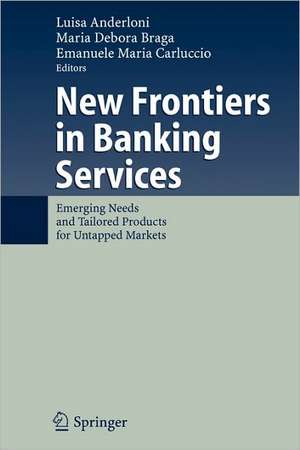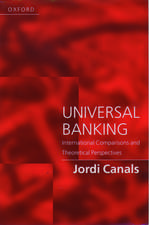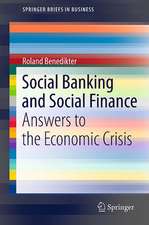New Frontiers in Banking Services: Emerging Needs and Tailored Products for Untapped Markets
Editat de Luisa Anderloni, Maria Debora Braga, Emanuele Maria Carluccioen Limba Engleză Paperback – 13 oct 2010
| Toate formatele și edițiile | Preț | Express |
|---|---|---|
| Paperback (1) | 943.71 lei 6-8 săpt. | |
| Springer Berlin, Heidelberg – 13 oct 2010 | 943.71 lei 6-8 săpt. | |
| Hardback (1) | 953.97 lei 6-8 săpt. | |
| Springer Berlin, Heidelberg – 12 noi 2006 | 953.97 lei 6-8 săpt. |
Preț: 943.71 lei
Preț vechi: 1150.86 lei
-18% Nou
Puncte Express: 1416
Preț estimativ în valută:
180.58€ • 196.77$ • 152.16£
180.58€ • 196.77$ • 152.16£
Carte tipărită la comandă
Livrare economică 23 aprilie-07 mai
Preluare comenzi: 021 569.72.76
Specificații
ISBN-13: 9783642079849
ISBN-10: 3642079849
Pagini: 392
Ilustrații: XII, 378 p.
Dimensiuni: 155 x 235 x 21 mm
Greutate: 0.55 kg
Ediția:Softcover reprint of hardcover 1st ed. 2007
Editura: Springer Berlin, Heidelberg
Colecția Springer
Locul publicării:Berlin, Heidelberg, Germany
ISBN-10: 3642079849
Pagini: 392
Ilustrații: XII, 378 p.
Dimensiuni: 155 x 235 x 21 mm
Greutate: 0.55 kg
Ediția:Softcover reprint of hardcover 1st ed. 2007
Editura: Springer Berlin, Heidelberg
Colecția Springer
Locul publicării:Berlin, Heidelberg, Germany
Public țintă
ResearchDescriere
This book is devoted to an issue that is the subject of growing interest amongst policy makers, financial providers and academics. That issue is the problem of unbanking or underbanking in developed countries. The issue has arisen because, faced with an ever more sophisticated and efficient financial system, an increasing number of people have found themselves in danger of being excluded from it. The goal of the papers that follow is to draw attention, both through a theoretical framework and through field study, to the need for banks, financial institutions, public authorities and non profit associations to increase their efforts to understand the process of financial exclusion, so that they can develop approaches to help people on low to moderate incomes to gain access to the whole range of financial services, from payment to savings, and from loans to investment. Some farsighted banks and financial institutions have already developed strategies, and introduced new products and services, to promote financial inclusion in these untapped markets. The research group is international and multi-disciplinary. The authors are grateful to the Italian Ministry for University Research (MIUR) for financial assistance provided under the “PRIN 2003” programme. The volume has been produced thanks to support from the University of Valle d’Aosta – Université de la Vallée d’Aoste (Italy), which has an leading reputation for encouraging research on financial innovation aimed at marginalised groups.
Cuprins
I.- Access to Bank Accounts and Payment Services.- Access to Credit: the Difficulties of Households.- Access to Investments and Asset Building for Low Income People.- II.- What Are the Specific Economic Gains from Improved Financial Inclusion? A Tentative Methodology for Estimating These Gains.- From Financial Exclusion to Overindebtedness: the Paradox of Difficulties for People on Low Incomes?.- The Role of German Savings Banks in Preventing Financial Exclusion.- Economic Growth and the Financial Inclusion: the Case of Poland.- Italian Banks’ Credit Approach Towards Low-Income Consumers and Microenterprises: Is There a Bias Against Some Segments of Customers?.- Banking the Poor: Policies to Bring Low- and Moderate-Income Households in the United States into the Financial Mainstream.- Migrants and Remittances.- Conclusions.
Caracteristici
Includes supplementary material: sn.pub/extras














